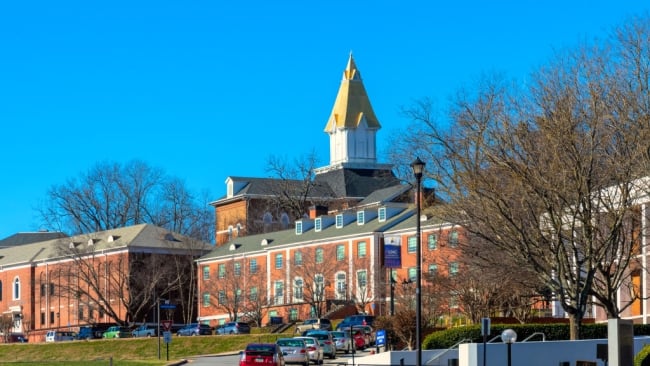You have /5 articles left.
Sign up for a free account or log in.

The University of North Georgia is one institution in the Georgia system where contractor Corvias operates residence halls.
Roberto Machado Noa/LightRocket/Getty Images
Months after the University System of Georgia engaged in a back-and-forth over a financial proposal with the company that operates some of its dormitories, the contractor said it wouldn't be cleaning adequately to meet state health department guidelines for the pandemic, according to newly disclosed emails and notes from university staff members. The company cut its staffing, and university employees began noticing maintenance issues in company-operated dorms, the documents indicate.
The documents, obtained by a faculty and staff union in Georgia through a public records request, provide a detailed look at the sometimes-tense relationships between universities and the companies they pay for services. As the pandemic sapped sources of revenue and drained bank accounts, Corvias, a privately owned Rhode Island-based company that contracts with universities to provide housing services, proposed a plan that would improve key financial indicators for its campus dorms. But the university system said no, and the company didn’t like its reasons.
Making a Deal
The partnership between Corvias and the University System of Georgia began in 2014, when the two signed a 65-year deal covering nine campuses. Public-private partnerships -- also called P3s -- like this one often allow the operator to get a cut of rental revenue in exchange for providing the up-front capital for a project. When a university doesn't want to borrow money for big project, like building a dorm, a company like Corvias can borrow it instead.
Documents suggest that the relationship between Corvias and the university system began to sour in March 2020. The pandemic meant that students in the residence halls Corvias operated on Georgia campuses were sent home. Refunds were provided to students who were made to leave, but under the terms of the public-private partnership, the university system, not Corvias, covered the refunds.
Later in the month, Corvias sent a proposal to University System of Georgia officials.
“Given the current crisis relating to the COVID-19 pandemic, the ability to generate summer revenue at the P3 student housing is greatly compromised and it is doubtful that any meaningful housing revenue will result from the P3 Program unless a creative solution is implemented. Corvias has that creative solution,” the proposal said. “Specifically, Corvias and its affiliates are exploring ways to lease such beds directly or to provide such beds to the USG Foundation through a charitable contribution.”
The company proposed injecting more than $5 million into the project from a new source. The company itself or an affiliate could spend the money to lease all the beds for the summer, increasing revenue for the project. Or Corvias could gift the beds to the University System of Georgia Foundation. The university system could then give the rooms for free to students if it wanted. The proposal wouldn't cost the university system anything and would also mean that it could unlock other funds.
“The result will be a win-win for all parties: USG will have available beds to assist in the COVID-19 crisis; the P3 Program will have a healthy balance sheet; Corvias will meet its financial covenants with its noteholders; and the [Board of Regents]/USG will receive approximately $1.4M in additional Retained Services, Contingent Rent and Reinvestment Reserves,” the proposal said.
Either option -- leasing the beds to an affiliate or gifting them to the foundation -- would have allowed Corvias to report revenue for the project and not have to utilize project reserves. When a project's cash flow dips, that affects a metric called its debt service coverage ratio. If the debt service coverage ratio falls below a certain threshold, that can trigger rating agency downgrades. It can also mean a project is in violation of the terms of its borrowing contract, creating tension with lenders.
Documents from the University System of Georgia suggest officials thought Corvias made the proposal because it was concerned about a possible downgrade from S&P Global Ratings.
In mid-April, USG declined the proposal.
“Thank you for the options presented during this Public Health Emergency and your offer to the USG to make housing available to us for the summer either through a Corvias affiliate purchasing Corvias summer housing stock from Corvias or via a directed gift to the USG Foundation directing the USG Foundation to purchase summer housing stock from Corvias. We understand and appreciate that either option would have the benefit of improving Corvias’ debt service coverage ratio,” wrote Tracey Cooke, executive vice chancellor for strategy and fiscal affairs, in a letter to Corvias. “Nevertheless, as our institutions will only be offering remote instruction for the summer, we do not currently have a need for additional student housing for the summer and therefore do not plan to pursue the Corvias Capital Infusion Scenario included in your proposal.”
The company responded by saying that the system's rejection was unreasonable.
“The only reason provided to date for the rejection of the proposal is that the [Board of Regents] does not need any additional student housing for the summer, a reason which is completely irrelevant to the goals of the proposal,” John Picerne, president of Corvias Campus Living, wrote to University System of Georgia officials. “The BOR decision will result in the P3 Program being in jeopardy of being downgraded, which could cause a default under Project Indebtedness and put at risk certain student facing operations in the P3 program.”
With that, Picerne gave a formal written notice that a dispute existed between the two parties and requested that unassisted negotiations begin that day. He urged the university system to reconsider the proposal.
In notes from an April discussion about the Corvias situation, university system officials listed a few reasons they were not inclined to take the proposal. Those included “Ethics and best practice.”
Earlier Disclosures
This isn't the first time Corvias communications with the University System of Georgia have provided a window into the negotiations between universities and their contractors amid pandemic-induced revenue shortfalls.
In May, as first reported by Inside Higher Ed, the company sent the University System of Georgia a letter suggesting that the system could not unilaterally make any decision that would prevent students from living on campus, discourage them from doing so or reduce housing fees. The company also said that while it intended to maintain cleanliness and social distancing guidelines to CDC standards in the residence halls, reducing dorm density was not part of that plan.
“While the CDC may be of the belief that reducing density in student housing may lower the possibility of infection, we do not believe that requires a reduction in the number of roommates that would typically be permitted in the Phase 1 Student Housing or the number of students that can be housed in a given building,” Corvias officials wrote.
After the letter was released publicly in August, a spokesperson for the University System of Georgia said it did not inspire any changes in university plans.
“No USG institution factored Corvias' demands into its campus housing plans for Fall 2020. Those plans had already been submitted to the system and followed DPH and CDC public health guidance. Nor did Corvias' letter cause subsequent changes,” the system said in a statement in August.
In new emails released by the employee union, Corvias officials told the university system that they were sending similar letters to all university partners. In addition to the University System of Georgia, Corvias advertises partnerships with Alabama College of Osteopathic Medicine, the California State University system, Howard University, North Carolina Central University, Purdue University, the University of Notre Dame and Wayne State University.
Inside Higher Ed obtained a similar letter sent to Wayne State University in August. The university said at the time that the company did not influence decisions about the fall semester and pointed to a committee system that determined semester plans.
“All decisions regarding fall semester, including campus housing, were made by those subcommittees and endorsed by the Public Health subcommittee consisting of campus medical experts and did not include Corvias,” a spokesperson emailed Inside Higher Ed in August.
Five Corvias employees were listed on a housing, dining and campus retail subcommittee at Wayne State that contributed to fall planning.
In response to questions for this article, an official at Wayne State said the university never received a cash infusion proposal and had no issues regarding cleaning in the dorms.
Media representatives for Cal State, Notre Dame and Purdue said their campuses did not receive such letters from Corvias, nor did they receive similar cash infusion proposals. A spokesperson for Howard University said she could not comment, as the university is closed for spring break.
Other institutions with Corvias partnerships did not respond to questions by the end of the day Tuesday.
A Breakdown
In early July, Corvias sent the University System of Georgia a proposed budget for the P3 housing project. That proposal, according to responses from university staff, would cut the project’s operating budget by 24 percent from the last academic year. Where the company had once provided 57 staff members, officials said in correspondence, it had now proposed to provide 10.
By the end of the month, people on the ground started to notice problems in Corvias-operated residence halls.
“While I was checking on second floor rooms for the Oak Hall virtual tour yesterday, I saw many rooms with command strips on the walls (and painting needed) general maintenance needs, in one room a toilet handle was broken in another an outlet was not working (GFCI), and in multiple rooms the inside door handle to the front door was loose and it took some trying to get back into the hallway,” a residence life coordinator wrote to Augusta University’s director of housing and residence life. “I have not seen any painters or maintenance done in Oak Hall rooms in the month I have been here, and have serious concern in moving students into rooms that look run down, and where door handles do not work for safety and fire safety.”
On Aug. 2, University System of Georgia officials drafted a message to Corvias.
“Corvias committed to have the rooms for all of Elm and Oak completed (move in ready) on Friday afternoon. That has clearly not happened,” they wrote. “What Corvias is doing at Augusta is not acceptable and does not meet the intent of [our contract].”
Three days later, system officials collaborated on another draft message, this one to campuses.
“As you are aware, Corvias, the P3 Concessionaire, has significantly reduced P3 staff levels including not having any custodial staff servicing your P3 housing facilities,” the message said. “We were also informed this week by Corvias that the cleaning services they customarily provide for our P3 facilities will not be at a level to meet the COVID-19 cleaning protocols recommended by the CDC and the Georgia Department of Public Health.”
The message directed campuses with Corvias-operated residence halls to create their own cleaning plans instead, either by hiring outside contractors or utilizing existing staff. A draft plan from Georgia State University examines hiring contractors from the company Abacus to do the cleaning for the fall semester, which would total $99,840. Georgia State did not respond to questions about whether the university followed through with this plan. Similarly, Augusta officials did not respond to questions about how or whether Oak Hall was cleaned.
On Aug. 6, Cooke, USG head of strategy and fiscal affairs, sent a letter to Corvias.
“Corvias has clearly indicated based on this proposed budget, recent staff reductions, and statements that it has no intent to meet its contractual obligations under the MCA and other operative agreements. Accordingly, BOR must be equally as clear to Corvias of its expectations and firmness to protect student safety, health, and educational experience,” the letter read, before reiterating some of the contractual obligations of the company. The staff reduction had already caused some necessary projects to be neglected, the letter said.
“BOR is no longer interested in rehashing conversations that begin or end with Corvias’s request for BOR to ‘creatively’ resolve any P3 Housing revenue shortfalls. Corvias fully accepted this financial risk and agreed that BOR does not guarantee occupancy levels at P3 Housing projects or Corvias’s projected revenue,” the letter said. “Although we can appreciate budgetary constraints, BOR is under no obligation to rescue Corvias from any financial hardship due to flat or declining occupancy or revenue shortfalls.”
Provided with copies of the documents, a USG spokesperson did not address them directly. Asked for comment, he said via email that “USG and its student housing partner Corvias are in constant communication to ensure that USG students’ housing experiences are as contracted for in the partnership agreements.”
Corvias did not respond to a request for comment.
The Response
Public-private partnerships are not new in higher education. Often, these partnerships work well enough for both parties. Companies make money, while colleges and universities improve services -- and sometimes make money themselves -- without going into debt.
In many cases, public colleges and universities will partner with a company like Corvias when they need to work on facilities but are unable or unwilling to raise enough money. If the institution has borrowed a lot of money in the past, it can be difficult to borrow more at good rates. Sometimes state governments put limits on how much a university can borrow.
But when the ink dries on a deal with Corvias, the company can then borrow the money itself, so that debt stays off the college or university's balance sheet. Often, the company will take a cut of rental revenue in return.
But sometimes an event -- maybe, say, a pandemic -- can sour that relationship. When interests diverge, parties are less likely to see contracts as beneficial.
“The university exists for a lot of different reasons. And a lot of them are really, really idealistic,” said Richelle Brown, a graduate student at the University of North Georgia who assisted with the union research. “Corvias is a private enterprise. It exists to make money.”
The United Campus Workers union, which represents both faculty and staff and obtained the documents, has said that the tension between USG and Corvias reflects some of the pitfalls of privatization in higher education.
“We can’t do our job when private corporations are looking after their own interests and pressuring our employer to do something that is not right for the public good,” said Rebekah Ward, a professor of biology at Georgia Gwinnett College and president of United Campus Workers Georgia. “How is the public being served by these public-private partnerships? I would say that the answer is ‘badly.’”
Union members have said that they also believe the system should re-evaluate the partnership and not make any more deals with Corvias.
“To have this private company come in and establish that the health and safety of our communities are secondary to their financial bottom line, their ideas of what’s profitable, it contrasts everything that we really stand for,” said Avery James, a teaching fellow in English at Georgia College and State University, who assisted with the research.
Jill Penn, a professor of biology at Georgia Gwinnett and a union board member, said she was reassured by the fact that the system pushed back against Corvias at several points. But she was troubled by the existence of the partnership and what it says about public education.
“Why did we need this in the first place? Why did USG have debt?” she asked. “We shouldn’t have let higher ed get to this point ever. We should be fully funding education.”
Public-private partnerships have grown more popular recently since their adoption by higher education beginning in the 1990s, said Kevin McClure, a professor of higher education at the University of North Carolina at Wilmington who studies privatization. At this point, most decently sized public institutions will have at least one partnership, he said, though those partnerships exist on a spectrum. As state governments have become less interested in providing funds so their institutions can build nonacademic facilities, private developers have become more interested in the student housing space.
It isn’t completely clear how much of the tension between Corvias and USG should be seen as routine and how much should be seen as an aberration from the normal business, McClure said. But the events illustrate some of the potential drawbacks of P3s.
Even if a university is protected by its contract, as USG officials suggested the institution was, muscling a company to hold up its end of the bargain takes energy and resources.
“It does illustrate a major source of conflict that can arise in public-private partnerships,” McClure said. “At the end of the day, that private entity is going to do what it thinks is necessary to maximize profit.”




